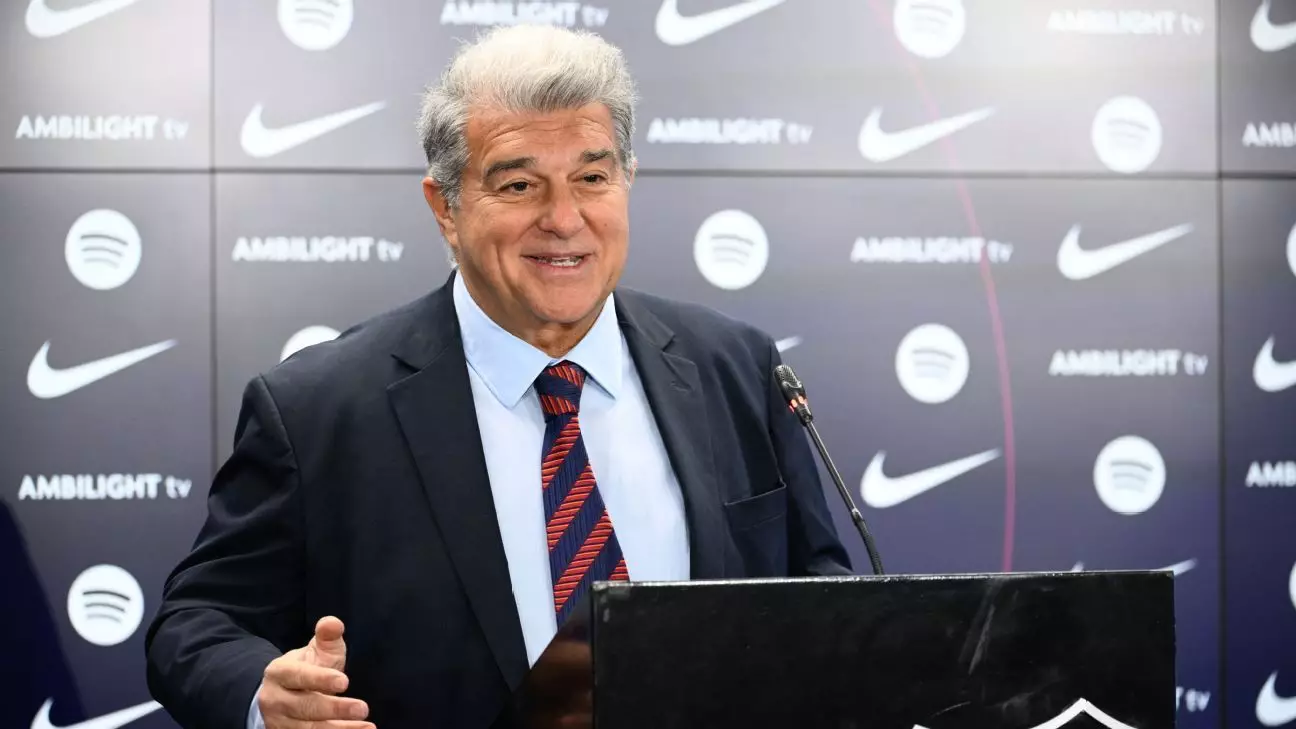The ongoing saga surrounding the registrations of players Dani Olmo and Pau Víctor has escalated tensions within FC Barcelona, drawing considerable media attention and raising questions about the club’s management and financial practices. Under scrutiny from both LaLiga and the Royal Spanish Football Federation (RFEF), Barcelona failed to meet a crucial deadline to demonstrate compliance with financial fair play (FFP) regulations. Consequently, this led to a temporary registration denial for the players, creating an atmosphere of uncertainty and speculation regarding the club’s operational integrity and future.
Barcelona’s president, Joan Laporta, has described the environment as one tainted by a concerted effort aimed at destabilizing the prestigious club. His assertions imply that criticism does not solely arise from external adversaries but also from factions within the organization — a sentiment that may reflect the internal rifts that often plague such high-profile institutions. Laporta’s two-hour press conference was marked by indignation as he asserted that various players in the football community were keenly invested in seeing Barcelona falter during what he termed a pivotal phase in the club’s history.
The notion of destabilization resonates deeply as it points to a complex interplay of both internal dissent and external rivalry. While Laporta refrained from naming specific individuals or groups antagonizing the club from within, his remarks about dissenting voices calling for his resignation underscore a reality where leadership struggles compound the existing pressures. It is not uncommon for clubs of Barcelona’s caliber, steeped in rich tradition and global admiration, to face challenges from conflicting interests and power dynamics.
Laporta placed emphasis on the club’s 125-year legacy, arguing that such historical depth instills resilience that can counteract any discrediting efforts. However, whether this assertion holds weight in the face of tangible financial difficulties remains a topic for debate. The rhetoric surrounding external criticisms, particularly from rival clubs that have publicly opposed the CSD’s decision to provisionally register Olmo and Víctor, adds another layer of complexity. The competitive tension among top-flight teams often manifests in verbal sparring, yet Laporta’s observations reveal a more profound concern regarding collective unity and support within the league.
As the registration crisis unfolds, Laporta has pointed to Barcelona’s financial strategies, elaborating on recent developments that he believes should affirm the club’s compliance with FFP. An enhanced partnership with Nike, projected to double and subsequently triple revenues, is a centerpiece of his argument, along with lucrative agreements involving the sale of VIP seating at Spotify Camp Nou. While these strategies indicate a proactive approach to financial recovery, they also provoke scrutiny regarding the long-term sustainability of such maneuvers. The club must balance short-term financial relief with long-term stability in order to reclaim its position among Europe’s elite.
Laporta’s insistence that all necessary documentation was presented to LaLiga in a timely manner raises key questions about the effectiveness of communication channels between clubs and governing bodies. The bureaucratic labyrinth of compliance often places clubs in precarious positions where misunderstandings can lead to severe ramifications. Whether or not Laporta’s administration adequately fulfilled its obligations remains to be seen, but it is clear that Barcelona’s leadership is under significant pressure to smooth over these burgeoning reputational setbacks.
Ultimately, FC Barcelona stands at a critical juncture, grappling with both financial realities and the weight of internal and external expectations. The path forward will necessitate not only a reevaluation of financial strategies but also a concerted effort to fortify unity within the club and its surrounding community. For a team aiming to cultivate a young roster poised to reinvigorate its storied past, it is essential that all factions work collaboratively rather than contribute to a narrative of discord.
As stakeholders await the CSD’s final ruling on Olmo and Víctor’s registrations, the broader implications of this saga serve as a cautionary tale for football clubs operating within an increasingly stringent regulatory framework. Therefore, the capacity for adaptability and transparency in the face of adversity will not only define Barcelona’s future but potentially reshape its enduring legacy in the landscape of football. As it moves forward, the club must harness its historic legacy while navigating the trials of modern financial governance.
